
Official Edgar Rice Burroughs Tribute and Weekly Webzine Site Since 1996 ~ Over 10,000 Webzines in Archive |

Official Edgar Rice Burroughs Tribute and Weekly Webzine Site Since 1996 ~ Over 10,000 Webzines in Archive |
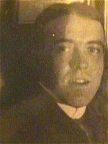 |
In The Life Of Edgar Rice Burroughs by R.E. Prindle Part 4 of 4 |
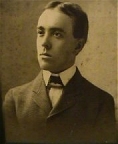 |
8.
"HE'S BACK."
By this time ERB would have been viewed as a real upsetter. Since 1890, except for a summer vacation or so ERB had only been in Chicago from late Spring of '97 to Spring of '98. Then he had gone away again for a year and now he was back spoiling some other people's plans.
Even after having deserted Emma Hulbert twice, the first time without notice for sure, and probably the second also she was still waiting for him. Amazing! Ten full years later when the biological clock was ticking loudest she was still there. If that's not true love I don't know what is.
It must be that ERB took it for granted that she would always be waiting for him because he was still willing to leave her at the drop of a hat, if he could only get that coveted officer's appointment.
As ERB walked down his street you could almost hear Alvin Hulbert say 'Drat! That young man is not going to set foot in this house.'
You could probably hear Frank Martin sucking in his breath muttering: 'What am I going to do about that boy?'
Papa Geroge T., holding that three hundred dollar note, welcomed him back restoring his old job to him.
The following account is based on two letters, one from R.H. Patchin dated 3/21/1950 and the reply from Jack Burroughs dated 4/4/1950. I learned of the letters which were quoted in part by Burroughs scholar Robert Barrett in the Fall 2003 issue of the BB. Danton Burroughs of ERB, Inc. subsequently was gracious enough to provide me with full copies as he had Mr. Barrett.
As of this date I have been unable to acquire any additional information of either Frank Martin or his associate, R.H. Patchin. The two letters which are appended reveal a great deal.
As of the time of the letter Mr. Patchin was from 68 to 70-75 years old. My guess is that Frank Martin couldn't have been younger than Emma so he was probably at least 25 to 30 years old in 1899. It is not impossible that he was older but as his exemplars in 'W.C. Clayton and Terkoz in Tarzan Of The Apes' and 'The Return Of Tarzan are approximately the same age as Tarzan Martin was most likely 25-27.
As Emma would be 23 at the beginning of 1899 which would be close to spinsterhood one may believe there was some anxiety on Papa Alvin's part to get her safely married. Martin was about the most advantageous marriage possible. At, say 27, he was looking at one of the last unmarried women of his age cohort. If he failed with Emma he would have to find a much younger woman than himself or take a woman who had already been married. He had some reason to resent this man he could not have known well who seeming not to care that much for Emma yet stood between himself and her.
Patchin says a lot in his letter to Jack Burroughs. He mentions the three times his and ERB's paths crossed. They were all unfortunate for Burroughs. In the first ERB got his head bashed in; in the second Patchin showed up just after ERB divorced Emma which divorce was mentioned in all the newspapers; the third was the condolence letter at ERB's death. Talk about an ill omened bird.
Sometime between ERB's divorce and 1950 Frank martin became 'the late.' He didn't survive his nemesis. I am guessing of course but Patchin's meeting with ERB after his divorce must have been arranged by Martin. He may even have been watching from a distance. One wonders if he ever married.
I only mention the following as a point of interest. By the time John Dos Passos wrote the third volume of his USA trilogy, 'The Big Money' Burroughs was already a major literary figure. As he didn't seem to court publicity he can't be said to have been a celebrity. In 'The Big Money' Dos Passos cameos a number of interesting people, among them Bernarr Macfadden.
It should be clear to everyone that nothing can be done in secret. Whatever passed between Martin, ERB and Emma must have been a source of gossip among Chicagoans. Somewhere along the way Dos Passos may have heard the gossip. In 'The Big Money' he includes a story about a woman named Evaline Hutchins. A segment of the story bears some resemblance to the situation between the three. In the episode the Martin-like character takes the Emma character driving. He cracks up the car leaving the woman with some explaining to do with her family.
I don't say it's so but suppose that in 1907-08 Martin, still seething at his rejection, in some way got Emma to go out driving with him with the above result throwing Burroughs into a panic. It was in 1908 that Joan was born to be followed immediately by Hulbert. Is it possible that after eight childless years Burroughs suddenly began a family as a defensive move against Martin? I can't say but it is a hint I would dearly love to follow up.
At the time Patchin wrote the letter in 1950, judging from his stationery, he was down on his luck. His sloppy typing can't be accounted for by old age alone, or perhaps a lifetime of hard living had left him a wreck. My conjecture is that he had been drinking when he wrote the letter.
You will notice that the stationery bears only a street address - 555 Park Avenue - and no indication in the body of the letter as to what city. Burroughs' reply provides the location, New York City. Patchin must have been clever enough to provide a return address on the envelope. The street address is printed rather than engraved so it is less expensive stationery. With no other address details provided it is obviously not Patchin's personal stationery. The paper must have come from a mailing address. The stationery was probably available to anyone. 555 Park Avenue is a lower East side address so Patchin was totally down on his luck. Probably drunk when he wrote.
He makes a glaring Freudian slip in the first paragraph when he says of ERB, 'He lived his wife well. Wife for life! Hence the letter is as much about Emma as ERB. Emma meant nothing to Patchin so he must be speaking for Frank Martin. He then immediately relates the anecdote concerning ERB's bashing in Toronto; thus Emma and the bashing are related. The one caused the other.
What follows then is extrapolated from Patchin's virtual confession and Jack Burroughs' reply. Burroughs hints that he knows more of the story than he is letting on. He and ERB had discussed this matter shortly before ERB passed over, he says.
Martin viewed Burroughs' return from Idaho with apprehension. Emma's delight at Burroughs reappearance disconcerted Martin's plans which he and Alvin probably thought were progressing well. Martin perhaps in talking with Patchin, if they were equals and friends which I doubt, may have said, 'How am I going to get rid of this guy?' 'Let's think about it.' Said Patchin. 'What kind of accident could he have.'
Indeed, that's how people get rid of someone they don't like, the victim has an 'accident.' Murder is for amateurs. Perhaps he steps on a banana peel; gets run over by a car going the wrong way down a one way street, pushed in front of a trolley car. The next question would have been, where, when and how?
Better that it should be out of town rather than in town.
How to get Burroughs out of town? Now we're talking old hat. You find a desirable reason for going somewhere, say, New York City, then you make arrangements.
In Frank Martin's case he had a perfect occasion. Frank's father, Col. L.N. Martin was a multi-millionaire who owned his own private rail car. In July of '99 the Col. was going to N.Y.C., so Martin extended an invitation to Burroughs to travel by private car to New York City. What a deal, huh?
Burroughs should have been surprised at the offer since the two weren't that close friends while they were rivals for Emma's favor. There should have been enough there to give one pause. Still, what a tempting offer.
The trip appears to have lasted at least three to four weeks returning to Chicago at the beginning of August. Clearly ERB and Martin were not in the same economic league. Our Man was receiving fifteen dollars a week. Martin could spend that for lunch every day and take Emma to the Theatre every night without a single concern for expense. There was no way ERB could have kept up so that the Martins had to have paid his way. Didn't ERB wonder why they would do that for a comparative stranger?

Private Rail CarThere was no questioning expenses from the Martin point of view. They owned a luxurious private car. It cost more than Burroughs made in a week to connect to a train. Jack Coleman Burroughs recalls: 'Dad also recalled on the same trip, a colored porter would knock on the stateroom doors the first thing every morning. The porter bore a silver tray upon which was a choice of "eye openers". According to DAD, this went on over different parts of the private car during the rest of the days and into the evenings.'
Thus ERB was accepting lavish hospitality he couldn't hope to reciprocate. This is a fairly humiliating situation. You cannot feel like an equal nor will you actually be treated as one. On the other hand he was kept tipsy, to say the least, for the whole trip.
When they got to New York ERB does not appear to have lived on the car. Once again with the Army fever on him he wrote Col. Rogers who was then in Washington D.C. in the hopes of gaining an officer's appointment. The return address given Rogers was 11 17th in NYC. That is the lower East side somewhere in the vicinity of the Bowery. Patchin was writing from somewhere in the same vicinity. Of course, the address could possibly have been a box of the railroad; the information is incomplete.
ERB's letter was sent on the 15th while Rogers very quick reply came back on the 22nd in the negative. He didn't have to give his reply much thought. Now, ERB was ready to abandon Emma again. Marrying her must have been a low priority in his mind.
If Martin had been thinking, rather than preparing an 'accident' for ERB he would have gotten his father, the Colonel, who must have had some influence, to secure Burroughs an appointment and have him sent to the Philippines. That would have made ERB eternally grateful while getting him out of Martin's hair. Frank missed a chance.
Sometime after the 22nd the return trip to Chicago began. As is usual in attempts of this kind the hit was delayed until the last minute. In this case the assassination was to take place in Canada to which, if anything went wrong, Martin would have to be extradited as they would cross the river into the United States from Toronto the next morning.

Crossing the Rouge River east of Toronto Grand Trunk YardsMore rounds of drinks were served as the train moved from NYC to Montreal and thence to Toronto. Probably a fairly lengthy trip as they might have had to switch trains a couple times.
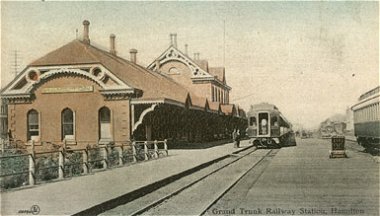
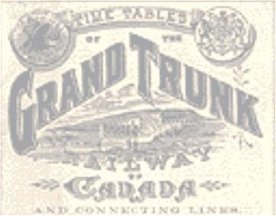
Neither Patchin or Jack Burroughs gives a date for Toronto. As this took place in 1899 there were no motorized taxis. As Patchin says the car was parked in the Grand Trunk yards. These 'three gentlemen songsters out on a spree' would have had to walk into town or hire a carriage, probably the latter as Martin had the money.At this point someone would have had to hire a thug to bash Burroughs. As I figure it the logistics was Patchin's job. I don't see him so much a friend of Martin's as an accomplice. In his letter he does not claim to be a friend of Martin, he does not say 'our' old friend but claims to have been a friend of ERB while ERB was a friend of Martin. Strange circumlocution when he could have just said 'our friend.'
Although Patchin describes the thugs as 'Canadian hoodlums' I wouldn't be surprised if they had been brought from Chicago contracted by Patchin there. It would have been easier and surer.
If you study Patchin's letter you will see that other than the slip of 'He loved his wife well' there are no other typos in the first paragraph. As he gets into his story in the second paragraph he begins to have difficulties. By the third paragraph when guilt seizes him he can't even spell his last word or keep the words on the same line. He begins emergency with two Es, can't spell the critical word 'hospital' crossing it out. Serious stuff.
Where did they go in Toronto on that memorable evening. Probably to the red light and gambling district, Toronto's answer to Chicago's Levee. Where else could you arrange such a fight with some hoodlums so easily. Patchin doesn't say whether the fight took place indoors or out, just that Burroughs took a smack to the head. Since his scalp was opened he was coshed with a sap or pipe.
He says that he didn't lose consciousness but he must have been knocked flat on his back. He must have had time to get his arm up to partially block the blow or he would most likely have been killed. As I see it, then, this was an assassination attempt. Martin meant to permanently get Burroughs out of the way.
As I see it Martin and Patchin faked the brawl. Patchin doesn't say that he and Martin had a hard time of it. No. Just that Burroughs got hit. Only Burroughs got hurt which is suspicious. After the first blow which could have been in the heat of anger which would still have been manslaughter, to have continued to belabor Burroughs would have been a clear cut case of murder which would have had to be thoroughly investigated. Thus the opportunity was lost when the first blow failed. Martin and Patchin apparently didn't even report the incident to the police. The 'Canadian hoodlum' could still have legged it across the border though. It is not impossible that he wasn't Canadian but a Chicago hoodlum contracted for the job before the private car left the Big Windy. Why not? Perfect job.
So at two in the morning when asked where he was staying ERB replied in our private car down in the Grand Trunk Station. Not Martin's car but our car. He quickly got used to the luxury of a private car.
As he was able to walk the party returned to the yards returning to Chicago the next morning.
9.
One may ask is there any evidence to show that Burroughs after he had thought about it for a while ever came to the conclusion that Martin and Patchin meant him harm. I think there is. In The Return Of Tarzan Burroughs puts these words into the mouth of Jane perhaps thereby more sternly admonishing Martin who might, not unreasonably, be expected to be reading these books. He obviously would get more out of them than we might.
Jane says: ...the terrible jungle. It renders even the manifestations of friendship terrifying.
A manifestation of friendship was the invitation to NYC from Martin. That was indeed terrifying. So that for the parties concerned if they read between the lines they had every reason to believe that Burroughs understood everything.
One of the consequences of the attempt on Burroughs' life was that he rushed back home to propose to Emma. Within five months they were wed taking her away from Martin. Emma had had a choice between a prince and a pauper and by some miracle had chosen the pauper. Really a very romantic story worthy of a movie on its own. Grand opera, the way I see it. Andrew Lloyd Weber should look into this one.
There were other serious consequences. Of the blow, Jack Burroughs says: "He suffered for a number of years with bad headaches from the blow he received in that fight, and attributed one or two short periods of amnesia to the rap. I remember the scar was quite evident on his forehead when we were children (Jack Burroughs was born in 1913 so the scar must still have been visible in 1920 although it doesn't show up in photographs.) but it seemed to disappear in his later life. Mother used to jokingly attribute his success to that blow."
Emma would be in a position to know.
So Burroughs suffered lasting injury from that blow -- one doesn't have periods of amnesia unless there is internal pressure on the brain. There is evidence that he suffered from such pressure.. Perhaps brain damage is too strong a phrase in this case but here is a clinical description that seems to fit the case. Per Brodal: The Central Nervous System: Structure and Function (3rd. Edition, page 433):
A peculiar form of amnesia occurs together with confabulation: that is the patient invents stories (without knowing that they are not real). Most of the patients have a lesion involving the substantia inominata, the medial hypothalamus, and the orbito frontal cortex (usually caused by a ruptured aneurism in the anterior cerebral artery). The often bizarre stories can usually be traced back to real events, although they consist of various, unrelated fragments from memory. It seems the patient is unable to suppress irrelevant associations, and cannot check them against reality.
That is pretty close to ERB's situation although he doesn't appear to have lost his connection with reality although his stories as fantastic as they are always relate to his own reality. The Corpus seems to form one gigantic web of psychological unity as Richard A. Lupoff has pointed out.
One would think that after such a fearsome blow he would have been kept at the hospital for observation for at least a day or two but as he appeared to have no more than an open wound the doctor sewed him up and sent him on his way. As Patchin says, the doctor came down to the yards the next morning to check up on the private car story which may have seemed incredible to him causing him to think his patient deluded.
There seems to be no reason to doubt that the blow ruptured the anterior cerebral artery. Thus internal bleeding over the next couple days would have created a clot which would have put pressure on the prefrontal lobe causing cobwebs, headaches and obviously a faulty memory with periods of amnesia.
There must be a medical reason for all these.
The symptoms should have begun showing up within a week or so, so that the several months of faintness ERB experienced began then. It was in this mental condition that he proposed to Emma.
Disappointed by the quick rejection of Col. Rogers while at least intuitively understanding that he had been set up in Toronto, ERB quickly went to work to capture Emma from Martin. I see little reason to believe that he had intended to marry her anytime soon before he went to NYC. If at all. Back in Chicago in August he and Emma were married by the end of January. In terms of years he was twenty-five and she twenty-four but in reality ERB was only four months older than Emma.
The sudden wedding must have been disconcerting to the Hulberts. I'm sure they envisioned a magnificent society wedding for their daughter. There was now no time to plan one so they were bitterly disappointed.
ERB now had to face a reality he hadn't planned for. His rough and rowdy days were over.
10.
While based on some documentation the foregoing is at present somewhat conjectural but let us see if we can find some discussion by ERB of these events in his writing. There are four titles that go over these events in slightly different ways. Certainly ERB had to ask himself what had happened. He gave it a lot of thought. Beginning in 1909 his answers came pouring forth. Minidoka 937th Earl Of One Mile Series M which was unpublished in his lifetime was the first of these efforts followed by Tarzan Of The Apes, The Return Of Tarzan and The Girl From Faris's. As 'The Girl' is concerned with the early married years rather than this period I will forego discussion of that title although it should be read in sequence with Minidoka.
Minidoka, which actually began ERB's writing career is directly concerned with this struggle between himself, Alvin Hulbert and Frank Martin. In the story the evil Brady represents Hulbert with the genuine thoroughbred godling, Rhi, representing Martin.
The wars and battles represent Hulbert's attempts to keep ERB away from Emma which ultimately fail. However the story may explain a curious situation in which ERB and Emma took up residence in the Hulbert home after marriage. Not a situation most newlyweds would want.
Alvin Hulbert had thought little of ERB for several years. The Army episode and the Denver stunt did little to improve his opinion of Our Man. How the New York trip was represented to him by Martin would be interesting to know. Probably Martin who had every incentive to slander Burroughs said he was drunk all the way to New York and back, drank continually. He may have said that they were in the red light district of Toronto at ERB's insistence. In other words, he probably made the most of the situation.
Undoubtedly terrified at his daughter's willfulness in marrying this ne'er-do-well Hulbert made it a condition of his consent that the couple live in his house where he could keep a close eye on ERB. I'm sure he was ready to have the marriage annulled at a moment's notice.
In Minidoka Rhi by a very devious trick puts Minidoka/Burroughs in a situation where he is meant to be killed, a situation not unlike Toronto - then rushes to the heroine Bodine/Emma to inform her that Minidoka is dead proposing marriage to himself instead. It didn't, but it could have really happened that way.
As in real life Emma/Bodine remains steadfast and true to Burroughs/Minidoka.
Thus the story mirrors the real life events in a fantastic manner as Per Brodal would suggest.
Minidoka was never published so the same material was available for a retelling. This was done in the first two Tarzan novels. Tarzan Of The Apes tells the story of Burroughs' life up to 1896 with some interpolations from the later period. The Return Of Tarzan covers the four years from 1896 to his marriage with Emma in 1900.
Always bear in mind that Burroughs has to tell his story with commercial ends in mind.
The blow to the skull made an indelible impression on ERB as well it might. In Tarzan Of The Apes, Tarzan takes three serious beatings, one with a gorilla from another tribe, perhaps representing John the Bully, and with Kerchak and Terkoz of his own tribe. In all of them Tarzan is beaten about the head and shoulders. Terkoz rips his scalp open from above the left eye over to his right ear. Clearly an exaggeration of the true wound but that must have been how it felt.
Kerchak delivers a blow to his head that would have killed him had he not deflected its force with his raised arm.
Then when Tarzan and Jane are in the jungle Terkoz abducts Jane causing Tarzan to rescue her killing Terkoz in the process. Thus in Program A Tarzan kills his adversary.
Running concurrently is Program B. Tarzan is a penniless jungle ape-man up against W.C. Clayton who is a genuine Thoroughbred godling as was Rhi in Minidoka. Tarzan feels he doesn't have a chance against Clayton so he magnanimously resigns Jane to him at the end of Tarzan Of The Apes.
There must always have been a sequel in mind because, as in reality Burroughs won Emma, Tarzan must win Jane.
The end of Tarzan Of The Apes may correspond to Burroughs joining the Army in 1896 while his finding Clayton embracing Jane in the jungle may correspond to his second Idaho trip in 1898
So that between 1896 and 1898 it may have appeared to him that he had lost out to Frank Martin. In 'Return' Tarzan retreats to Opar which is his fantasy world with the beautiful but unobtainable Anima figure, La. At this early date he and Emma/Jane are fighting it out in his mind for his allegiance.
Tarzan is captured by the Oparians destined for sacrifice to the Flaming God of which La is Chief Priestess. Burroughs reverses the situation and instead of squelching his imaginary La she is about to sacrifice him. Burroughs can't renounce his Anima fantasy so rather than kill him which would end both Burroughs' wish persona of Tarzan and his relationship with La, she releases him. Tarzan/ Burroughs then triumphs over W.C. Clayton winning Jane/Emma. Jane/Emma leaves Opar never to return. La remains in Opar until Tarzan The invincible when Burroughs is about to leave Emma and take up with his Anima figure, Florence Gilbert. La then comes out of Opar in the same way Burroughs leaves Emma for Florence. Opar disappears from the Corpus, never being mentioned again.
Then as 'Return' ends Burroughs and Emma are married mirroring his fantasy where Tarzan and Jane are married. while not literal as Burroughs is writing for publication and must construct an interesting and, at least, nominally possible story he confabulates events from his life into a fantastic and improbable tale.
The history of his slugging which closes this period was mysteriously obscured by his youngest son John Coleman Burroughs. These two letters were only discovered by Danton Burroughs, John Coleman's son, recently. They were unknown to biographers Fenton, Porges and Taliaferro. For decades it was believed that Burroughs had been coshed in Idaho by a policeman as an innocent bystander in a saloon brawl.
In an interview with Porges Jack Burroughs told this latter story in 1970. Porges then dutifully reported the Idaho story in his biography. The question is why would Jack invent the latter story to replace the true one of which he was aware. As he himself replied to Patchin having previously discussed the event with his father I don't see how he could have forgotten it. Nor was there any need for him to even tell Porges the Idaho invention.
Perhaps Jack knew details buried away in the archives wishing to lay down a false trail to disarm the curiosity of Porges.
In 1899 ERB had had the direction of his life changed by a rap on the head. He now had to face a life filled with heavy responsibilities which he had been able to avoid to this point.
We see a new Edgar Rice Burroughs emerge from his early married years.
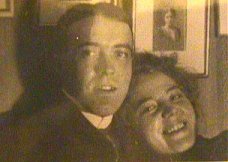
![]()
ERBzine Web Refs
R. E. Prindle welcomes your comments
at:
dugwarbaby@yahoo.com
|
and Follow the Navigation Chart for the Entire Series of Articles |
|
Differing viewpoints are welcome. |
|
are not necessarily those held by Edgar Rice Burroughs, Inc. |
![]()
![]()
![]()
![]()

![]()
BILL
HILLMAN
Visit
our thousands of other sites at:
BILL
AND SUE-ON HILLMAN ECLECTIC STUDIO
ERB
Text, ERB Images and Tarzan® are ©Edgar Rice Burroughs, Inc.-
All Rights Reserved.
All
Original Work ©1996-2004/2010 by Bill Hillman and/or Contributing
Authors/Owners
No
part of this web site may be reproduced without permission from the respective
owners.